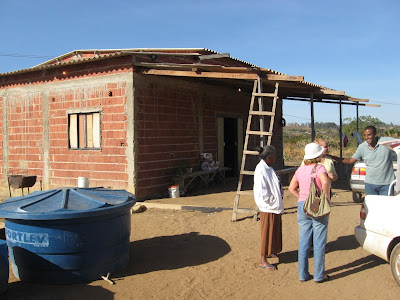I have been following the case of the Monjolo neighbourhood. Monjolo - or Núcleo Rural Monjolo - is the name of a poor rural neighbourhood here in Brasília, Brazil.
Let me try to write down their story.
The story begins at Cidade Estrutural, another city within the Federal District of Brazil. In July of 2007, TERRACAP, the government branch that looks after land allocation and urban "planning", went to speak to a number of people saying the government was going to build an Olympic Villa and that they had to move. Most of the families survived by picking garbage, recycling garbage, or with small occasional services. Some of the families had enough area for small plantations to grow some vegetables. Most of them was going through the process of getting their land ownership papers. When they moved there, that was "no man's land". On average these families lived there 15 years before the forced removal. (Speaking to people of other neighbourhoods, I learned that here in the Federal District it is common for poor families to apply for land ownership, with lawyers of good faith or pro-bono, but the government doesn't hand out "official" papers, just because they are poor. They end up getting some papers where the land is kind of theirs. )
After July 2007 a year went by and nothing happened. Until government employees and a local deputy (Eliana Pedrosa, who is a candidate again in 2010) showed up and handed out a notice that these 40 families had 48 hours to leave their homes. The community leader, Ismael, said at the time that in a closed-door meeting with the then Governor Mr. Arruda, the Governor said that these families would have to leave peacefully or by force.
A little more context. And this context is specially important for folks in North America and Europe. The government of the Federal District got a US$ 115,000,000 (15 million US$) loan from the World Bank to implement a project called "Brasília Sustentável" (Sustainable Brasília). The contract is registered as contract number 7326-BR. This plan contemplated a number of urban changes throughout the District. For the Cidade Estrutural it included the construction of an Olympic Villa, the construction of popular homes for displaced families and sewage. Part of the money was to be used to completely shutdown the local garbage dump. Indeed, Cidade Estrutural began because of the local garbage dump, which attracted families that had nothing and survived eating from the garbage and recycling paper and plastic from the garbage. The money was completely consumed. The garbage dump is there until today. The Olympic Villa is nearly finished. By 2008 the houses were not ready. However, the planned time schedule agreed with the World Bank required the government of the Federal District to remove a number of families for sewage work. If that wasn't done the World Bank would not forward the second part of the loan to the government. So the government rushed to comply with the time table. The government removed 40 families by force from Cidade Estrutural to the Núcleo Rural Monjolo. Núcleo Rural Monjolo had no infrastructure whatsoever.
To be continued.
Below are some photos at Núcleo Rural Monjolo in 2010.






No comments:
Post a Comment